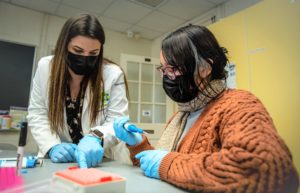Christiana Care researchers, clinicians and volunteers played an important role in sharing information on the scope of community-engaged studies and projects during the 2016 ACCEL Research Exchange, a day of networking among academic and community partners.
A focus of the May 23 conference at Nemours/Alfred I. duPont Hospital for Children was examining the problem of violence and reaching for solutions through community-driven partnerships.
“We are working on community-engaged research to improve the health of Delawareans and, in support of that, our overarching theme this year was the public-health problem of violence,” said Omar Khan, M.D., MHS, FAAFP, co-director, Community Engagement and Outreach, ACCEL, and physician leader of Christiana Care’s Primary Care & Community Medicine Service Line. “Addressing and preventing violence in our neighborhoods is a real community need.”
The annual conference is part of the institutional partnership among Christiana Care, the University of Delaware, Nemours/A.I duPont Hospital for Children and the Medical University of South Carolina through a $20 million, five-year grant from the National Institutes of Health, along with $5 million from the state of Delaware and $3.3 million in matching funds from the research partners. The federal grant, formally known as Delaware CTR-ACCEL, was awarded to the collaborating institutions in 2013 to accelerate clinical and translational research and build research infrastructure.
“As partners, we all have complementary missions: building a strong collaboration to enhance health care with research projects that are meaningful and vital to our community,” said Dr. Khan.
The morning keynote speaker was David Vlahov, Ph.D., RN, FAAN, dean and professor at University of California, San Francisco. He spoke about a community-academic partnership in Harlem studying the effectiveness of pharmacies selling syringes without a prescription as a means of lowering transmission of HIV among drug users. With low initial use of the program, the Harlem community-academic partnership conducted an information campaign to reach intravenous drug users, pharmacies and the wider community. The program suggests that community academic partnerships can accomplish broad-scale mobilization, said Vlahov, adding that the effectiveness of mobilization efforts can be designed, measured and summarized.
Howard Pinderhughes, Ph.D, chair and associate professor of social and behavioral sciences in the School of Nursing at the University of California, San Francisco, presented on “Healing from Adverse Community Experiences: Public Health Strategies to Prevent/Address Trauma-Related Violence,” drawing on his research on youth violence prevention and health disparities among youths.
“We welcome an understanding of projects like these, as we improve urban health in Delaware through collaborative, community-based programs and research” said Dr. Khan.
Speaker Rita Landgraf, secretary of the Delaware Department of Health and Social Services, addressed risk factors for gun violence. She pointed out that living in impoverished conditions, having low educational attainment and experiencing abuse as a child are all factors for being involved in gun violence in a lifetime.
Landgraf said the Centers for Disease Control and Prevention has a public-health violence-prevention model based on multidisciplinary science that Delaware is working to implement. That model is based on defining and monitoring a problem, knowing protective factors that are a buffer against risk, developing and testing prevention strategies and implementing evidence-based programs.
Christiana Care clinicians and researchers presented community-based research initiatives:
- Heather Bittner Fagan, M.D, MPH, FAAFP, associate vice chair for research in Family & Community Medicine and team leader of the ACCEL Community Engagement Awards and Brian Rahmer, Ph.D., MS, director of community health engagement in the Department of Pediatrics, shared practical information on how researchers and community partners can collaborate on a community-engaged research project. ACCEL offers grants and other funding opportunities. To-date, ACCEL has awarded more than $1.5 million in research funding. Areas of study have included improving outcomes for infants who have cardiac surgery, community assets and barriers to reducing childhood obesity, and a better understanding of treatment-resistant breast cancer cells.
- LeRoi Hicks, M.D., MPH, vice chair, Department of Medicine; and Claudine Jurkovitz, M.D., MPH, Value Institute senior physician scientist, talked about the use of “big data” sets with sophisticated algorithms to identify trends. They shared strategies for the use of large databases to address issues of gun violence.
- Sandra P. Medinilla, M.D., medical director, Violence Prevention, helped launch Cease Violence in Wilmington, a nationally recognized program to prevent gun violence by identifying nonviolent solutions to resolve conflict. The majority of gun violence victims in Delaware are treated at Christiana Care.
- Chaz Molins, MSW, LCSW, coordinator of violence outreach, intervention and community engagement, leads Christiana Care’s Youth Violence Prevention Program, which dramatizes the consequences of gun violence for teens and introduces them to young people directly affected, such as Christian Harris of Bear who lost his right leg to a severe gunshot wound, to encourage teens to make good choices to avoid gun violence.
- Rahmer and co-investigator Nora Katurakes, MSN, RN, OCN, manager, Community Health Outreach and Education, Helen F. Graham Cancer Center & Research Institute, are collaborating with colleagues at Christiana Care and in the community to assess the value of community health workers by surveying individuals who have used community health services.
- Rahmer and Christopher Moore, BA, LSSGB, program manager of Community Health in Family & Community Medicine, are leading a pilot project on using video journaling as a research method. With co-investigators from other institutions, the project uses video journaling as an assessment tool with adolescent males studying the “Wise Guys: Male Responsibility” curriculum developed to prevent teen pregnancy.
- Scott D. Siegel, Ph.D., director of Psychosocial Oncology & Survivorship at the Graham Cancer Center and a Value Institute Scholar, is a co-investigator for “Examining Survivors of Cancer and Physical Activity in Delaware: A Community-Based Participatory Research Needs Assessment.” Most cancer survivors do not meet minimum recommendations for physical activity. This project is assessing the collective awareness of survivors regarding physical activity and cancer and physical activity programs and services available to Delaware cancer survivors.



